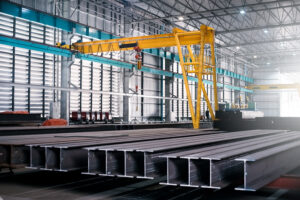The owners of Britain’s second-biggest steel producer are seeking an urgent package of financial support from taxpayers amid renewed fears for thousands of industrial jobs in the north of England.
It is understood that Jingye Group, which bought British Steel out of insolvency in 2020, has told ministers that the company’s two blast furnaces are unlikely to be viable without government aid.
British Steel, which is headquartered in Scunthorpe, north Lincolnshire, employs about 4,000 people, with thousands more jobs in its supply chain dependent upon the company.
The request from Jingye poses a major headache for Jacob Rees-Mogg, the new business secretary, on the eve of the Conservative Party’s annual conference in Birmingham.
While the precise scale of the support being sought by the Chinese industrial group was unclear this weekend, insiders suggested that it would need “hundreds of millions of pounds” to keep the Scunthorpe blast furnaces operational.
It was also unclear whether any financial subsidy would be in the form of a loan or grant.
One insider said that Jingye was prepared to make thousands of people redundant if ministers rejected its request.
It would then plan to import steel from China to roll at British Steel’s UK sites, according to the insider.
This weekend, the government confirmed that it was “working at pace with the company to understand the best way forward as it seeks to secure a more sustainable future”.
“We recognise that businesses are feeling the impact of high global energy prices, particularly steel producers, which is why we have announced the Energy Bill Relief Scheme to bring down costs,” a spokesman for the Department for Business, Energy and Industrial Strategy said.
“This is in addition to extensive support we have provided to the steel sector as a whole to help with energy costs, worth more than £780m since 2013.”
Industrial consumers of energy have complained for months that soaring prices are imperilling their ability to continue investing, with continuing uncertainty about the duration and cost of a recently announced government subsidy scheme.
For Mr Rees-Mogg, who took over as business secretary less than a month ago, a decision over government support presents a politically undesirable menu of choices.
If no state funding is made available and significant numbers of jobs are axed, it would undermine a key tenet of the ‘levelling-up’ strategy that became a doctrine of Boris Johnson’s administration.
An agreement to provide substantial taxpayer funding to a Chinese-owned business, however, would almost certainly provoke outrage among Tory critics of Beijing.
China’s role in global steel production, after years of international trade rows about dumping, would make any subsidies even more contentious.
A British Steel spokesman said: “We are investing hundreds of millions of pounds in our long-term future but like most other companies we are facing a significant challenge because of the economic slowdown, surging inflation and exceptionally high energy and carbon prices.
“We welcome the recent announcement by the UK government to reduce energy costs for businesses and remain in dialogue with officials to ensure we compete on a level playing field with our global competitors.”
It is the second time in little more than three years that serious doubt has been cast over British Steel’s future.
In May 2019, the Official Receiver was appointed to take control of the company after negotiations over an emergency £30m government loan fell apart.
British Steel had been formed in 2016 when India’s Tata Steel sold the business for £1 to Greybull Capital, an investment firm.
As part of the deal that secured ownership of British Steel for Jingye, the Chinese group said it would invest £1.2bn in modernising the business during the following decade.
Jingye’s purchase of the company, which completed in the spring of 2020, was hailed by Mr Johnson as assuring the long-term future of steel production in Britain’s industrial heartlands.
“The sounds of these steelworks have long echoed throughout Yorkshire and Humber and the North East,” he said.
“Today, as British Steel takes its next steps under Jingye’s leadership, we can be sure these will ring out for decades to come.
“I’d like to thank every British Steel employee in Scunthorpe, Skinningrove and on Teesside for their dedication and resilience which has kept the business thriving over the past year.
“Jingye’s pledge to invest £1.2 billion into the business is a welcome boost that will not just secure thousands of jobs, but ensure British Steel continues to prosper.”
Tata, which owns the vast Port Talbot steelworks in Wales, remains Britain’s biggest steel producer.
It, too, has sought government support in recent months, with the Financial Times reporting in July that the Indian-owned group was seeking £1.5bn of taxpayer funding to help it decarbonise its operations.
Liberty Steel, the third-biggest player in the industry, saw a bid for £170m in state aid rejected last year by Kwasi Kwarteng, the then business secretary.
As chancellor, Mr Kwarteng will play a key role in determining the fate of Jingye’s request for support.
This weekend, it was unclear how quickly a decision would be reached by ministers or whether advisers had been drafted in to help negotiate on either side.
A government insider pointed out that a range of support schemes aimed at heavy industry remained operational.
Read more:
British Steel’s Chinese owner seeks huge government aid package



























